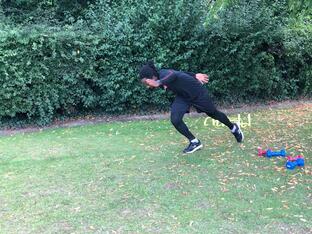 I would say 99.9% runners have made mistakes at some point during their training, before and after racing. The sad reality in most cases, we repeat the same mistakes repeatedly. Some people will learn from their mistakes (like myself) and take further steps to ensure not to be repeating the same mistakes in the future. I am going to outline for you four of the most common running mistakes and how you can avoid running injuries and other issues. 1. Running Shoes: Wearing old running shoes or wearing the wrong type of running shoes for your foot and running style can lead to running injuries. What You Should Do : Go to a running speciality store, where knowledgeable salespeople can evaluate your running style and foot type. When they determine whether you're an over-pronator, under-pronator, or neutral runner, they'll make shoe recommendations for you. Once you get the right pair of running shoes, make sure you replace them every 300-350 miles because the loss of cushioning can lead to injuries. About halfway through the life of your shoes, you might want to buy another pair to rotate into your runs. 2. Too Much Running: Many runners, especially people who are new to running, make the "terrible too's" mistake. They get so excited and enthused about their running that they do too much mileage, too fast, too soon. They start registering for lots of races, without taking any time off to rest and recover. They mistakenly think that "more is better" when it comes to running. As a result, they often start to develop common overuse running injuries, such as shin splints, runner's knee, or ITB syndrome. In some cases, they may get burned out quickly and lose interest in running. What You Should Do : Be more conservative than you think you need to be with how often, how long, and how much you run, especially early on in your development. Increase your mileage gradually. Don't let your weekly mileage increase by more than 10%.3 If you're new to running or are coming off a long break, start with walking first, and then progress into a run/walk program. 3. Hydration: Many runners underestimate how much fluid they lose during runs and don't drink enough because they're worried about side stitches. As a result, they suffer from dehydration, which can be detrimental to your performance and health. What You Should Do: Runners need to pay attention to what and how much they're drinking before, during, and after exercise. Here are some simple rules for drinking and running:
4. Nutrition : Many beginning runners underestimate the importance of nutrition, for both their running performance and their overall health. What and when you eat before, during, and after your runs have a huge effect on your performance and recovery. What You Should Do: Try to eat a light snack or meal about 1 1/2 to 2 hours before a run. Choose something high in carbohydrates and lower in fat, fiber, and protein. Some examples of good pre-workout fuel include a bagel with peanut butter, a banana, and an energy bar, or a bowl of cold cereal with a cup of milk. To avoid gastrointestinal distress, stay away from rich, high-fiber, and high-fat foods. If you're running more than 90 minutes, you need to replace some of the calories you're burning. You can get carbs on the run through sports drinks or solid foods they are easily digested, such as energy gels, bars, and even sports jellybeans designed for long-distance runners.
3 Comments
24/8/2020 11:24:52 am
That’s wonderful. many things to learn. thanks for sharing
Reply
24/8/2020 11:26:16 am
very interesting , good job and thanks for sharing such a good blog
Reply
Leave a Reply. |
AuthorsThis blog is updated by Tranquillity 360 fitness personal trainers, as well as other guest bloggers. Archives
July 2021
Categories |

 RSS Feed
RSS Feed